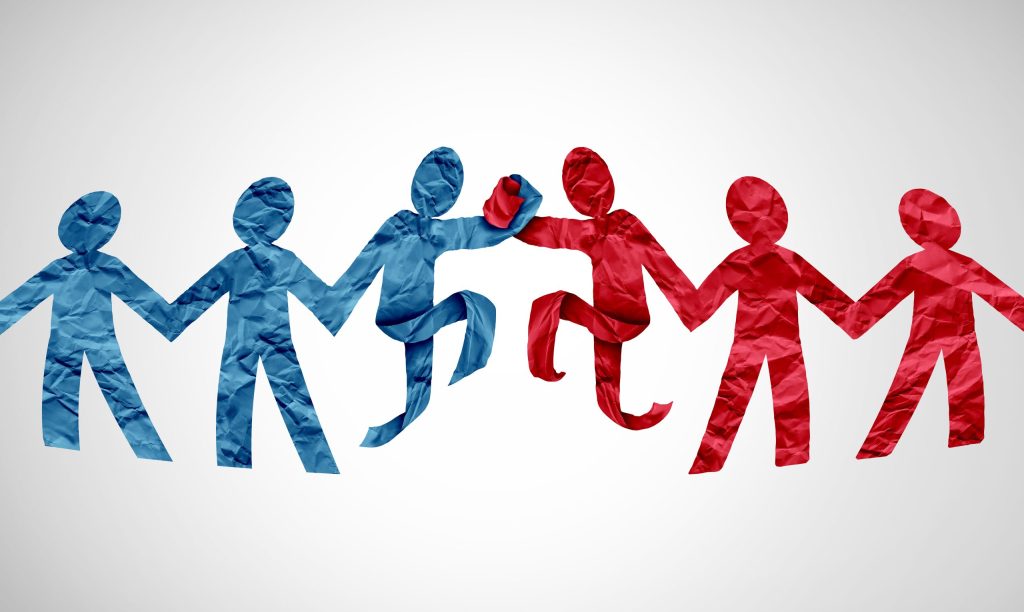 United group cooperation and team collaboration as a business success concept in a 3D illustration style.
United group cooperation and team collaboration as a business success concept in a 3D illustration style. When both Republicans and Democrats agree on an issue, the issue must be rather basic. Both parties agree that inflation is not ideal. Both parties agree that literacy is important. Both parties agree that sleep is necessary for humans. But, apart from basics like these, they agree on little else.
However, new research indicates that the majority of both Republicans and Democrats agree on something else: America’s higher-education system is headed “in the wrong direction.” 73 percent of Republicans agreed with this proposition, while 52 percent of Democrats agreed.
According to a survey by Public Agenda, a nonprofit research and public-engagement organization, around half of Americans (51 percent) believe “a college education is a questionable investment because of high student loans and limited job opportunities.” 59 percent of Republicans agreed with this statement, while 40 percent of Democrats concurred.
There is bipartisan frustration at the costs of higher education. The Public Agenda survey shows bipartisan frustration at the costs of higher education. 77 percent of Republicans and 88 percent of Democrats agreed that student debt is a problem. 68 percent of Republicans and 87 percent of Democrats believed that low-income students are receiving too little financial aid. 71 percent of Republicans and 82 percent of Democrats agreed that middle-income students could not afford college because their parents earned too much money for them to qualify for financial aid.
Hearing that higher education is headed in the wrong direction comes as no surprise to many Republicans. Almost daily, headlines blaze with another story of a Republican college student being censored on campus for his or her opinions. Read a couple of the Martin Center’s articles; it is clear that the mainstream academic establishment is unfavorable toward Republicans. The real surprise is finding that many Democrats agree that higher education is headed in the wrong direction.
For many decades, the voters most optimistic about and most in favor of education have voted Democratic, but now many Democrats express concern about the state of American higher education. How did this new sentiment come about? One Democratic writer calls it a “common sense problem.” In an article for The Liberal Patriot, Ruy Teixeira asserts that the loudly vocalized educational aims of the Critical Race Theorists and social-justice warriors do not represent the beliefs of the average Democratic voter. He mentions a survey in which voters in the hyper-blue state of Massachusetts were asked whether they agreed or disagreed with the following statement: “Racial achievement gaps are bad and we should seek to close them. However, they are not due just to racism[,] and standards of high achievement should be maintained for people of all races.” Their response was telling. The statement was affirmed 73:19.
Similarly, while many education activists in the Democratic Party promote the censoring of perceivedly offensive speech, a Pew Research Center report attests that public free speech on college campuses is overwhelmingly approved. 87 percent of American adults say it is “more important to allow people to speak their minds freely, even if some students find their views upsetting or offensive, than it is to ensure that students aren’t exposed to views they find upsetting or offensive.”
Democratic voters’ confidence in their party to handle educational issues is at its lowest in 20 years. Indeed, a survey by Education Next reveals that Democratic voters’ confidence in their party to handle educational issues is at its lowest in 20 years.
The majority of Democrats and Republicans do disagree concerning whether discrimination affects students’ ability to attain a degree. 79 percent of Democrats agreed to the proposition that “racial discrimination makes it harder for students of color to get a college degree,” while only 30 percent of Republicans affirmed the statement.
Regarding the other questions in the Public Agenda survey, both parties are mostly in agreement. The survey reveals a broad consensus on proposed reforms to higher education. 89 percent of Democrats and 78 percent of Republicans supported increased financial aid to low-income students. 84 percent of Democrats and 78 percent of Republicans supported “increased oversight” of institutions that are underperforming in their service to low-income students. 86 percent of Americans believed public colleges and universities should be required to tell incoming students how much debt they will incur, while 79 percent backed tax incentives for employers helping to pay their employees’ tuition.
According to this evidence, it appears that many Democrats and many Republicans are leaning toward the Martin Center’s viewpoint: Public colleges and universities are in need of renewal.
Keller Moore is a student at Thales College, where he studies the classical liberal arts and entrepreneurial business, and was a summer ’22 intern at the James G. Martin Center for Academic Renewal.
